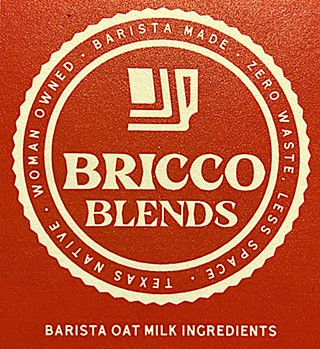Pimping Art, Roasting Beans, Milking Oats: The Dear Diary Story
Amalia Litsa’s vegan coffee shop stays creative to survive
By Wayne Alan Brenner, Fri., April 15, 2022
Longtime Austinite and creative community familiar Amalia Litsa opened her vegan coffee shop Dear Diary, part of a revitalized retail strip near the corner of 12th & Chicon, just as the COVID-19 pandemic was starting.
She and business partner Joshua Adrian struggled to keep the place going through months and months of lockdowns and social distancing and varying safety levels. And together, somehow, with willing workers and a loyal neighborhood community, they helped the place to survive.
Maybe even, relatively speaking, to thrive.
Selling coffee, selling pastries, selling art supplies and artist merch. Providing a bright and welcoming neighborhood hangout spot in the midst of fraught times. Onward, though the 'ronas.
Now Litsa has bought Adrian's share of the business, is running Dear Diary solo (albeit with a scrappy crew of coffee wranglers), and is plotting, like a Bond-movie anti-villain intent on committing good, to take over the world of barista-ready oat milk. We figured it was about time to check in with this local mover and shaker, to see what it's like running a vegan coffee shop as Our COVID Situation moves from pandemic to endemic and the food service industry attempts to reconfigure itself along more equitable lines.
Austin Chronicle: Why'd you start Dear Diary in the first place? Why, of all things, coffee?
Amalia Litsa: It was really the art part. I moved to Austin in 2002; Austin Sketch Group started in 2004, and I would go weekly to the meetup. That was how I made all my friends. It was mostly indie comic artists at the time, and it had such a huge influence on my career: I got my Scanner Darkly gig [as animator for Richard Linklater's film] because I learned about it through Sketch Group people. And, back then, the seed was planted in my mind: Wouldn't it be so cool to have a coffee shop that's oriented to artists? What amenities would I have for them? Of course I'd have outlets for all the people working on their laptops and whatnot, but maybe I could also have good lighting and inspiring art on the walls and maybe a little art-supply retail space. So, with Dear Diary, I was trying to create the environment I wanted. And of course I love coffee! But I don't think I would've had the passion about this idea, to actually drive me to doing it, had I not had the desire to build a creative community space.
AC: And, in spite of the pandemic, y'all seem to be doing ... well?
AL: I won't lie – it hasn't been easy. Dear Diary doesn't know what it's like to be alive in a normal economy. But we didn't qualify for any kind of federal, state, or city aid as a new business – because they're all based on prior-year records. And that makes sense, because otherwise everyone would be like, "Yeah, sure, I own a coffee shop, give me money!" But so we didn't qualify for any kind of relief, we just had to bootstrap it and survive on our own. When we couldn't use our dining room due to capacity limitations, I turned it into an art retail space. I couldn't afford more inventory, but I could pay artists on a consignment basis. And that worked out for them, because all of the regular art markets were limited or shut down. So when people were looking for side hustles, I had a side hustle for them. Even though we weren't having artist meetups, at least we had artists in here, displaying their work. So we pulled through.
AC: And you switched to roasting your own coffee, too. Was that part of your survival tactics?
AL: All of this is survival-inspired. The constraint-breeds-creativity thing happened with the art and with the roasting. We weren't planning to roast our own coffee so quickly, it wasn't part of the original game plan at all, because there's a lot of excellent coffee roasters in Austin and we would've been happy to keep carrying the beans roasted by another brand. But it's just so much more cost-effective to roast our own – and it's good for our brand, for differentiating ourselves in the market. And I have this opportunity to really think about the farms we're buying the beans from, and that's exciting to me. And then, with the oat milk, it was the same thing. As a vegan myself, I always used to complain about the "vegan tax," you know? Why does it cost more if there's less ingredients in it? Like, why does this cupcake cost more when it's got the same ingredients as this other one except you kept the eggs out? Can you just pay me for the eggs?
AC: [laughs] OK, I know oat milk's a big thing with you, and we'll definitely get back to that, but – the roasting?
AL: So, us and a few other coffee shops share an oven up in Georgetown. There's a master roaster who works up there, and he helps all of us – he does the hard part. We design the coffee, we import it and give him feedback, but he actually sits there and works the equipment, watches the roasting beans. Right now we're working with a couple different importers, and they deal with farms all over the place. So we've got coffee coming in from Guatemala, Colombia, Brazil, and some Ethiopian Sidamo, and we have Rwandan coffee – which most shops in town don't have. Basically, we've got a smattering of berry-flavored African coffee, stone-fruit-flavored Central American coffee, and then Brazil is mostly for mouthfeel. We're mostly working with that palate right now. But there's a new crop of coffee berries that come in with the spring harvest, so I'm looking forward to running out of our current supply, because, "What are we gonna replace it with?" And I actually don't know yet.
AC: And finally, what about this oat milk? Bricco Blends?
AL: Yes! So, with the oat milk, I was like, "Maybe, to cut costs, we can start making our own oat milk in-house?" And I tried, but I realized that my baristas would have to spend so much time pureeing and straining oats that it would cost more in the end. And they'd probably all quit – because it's not fun. So what if I could make it to where all the baristas had to do was blend ingredients in water – without any pureeing and straining? So I spent over a year just formulating an oat milk that would foam for lattes – because homemade oat milk doesn't do that – and that would be minimal effort for the baristas. It's so much science, you know? If I'd gone to school for food science, maybe I could've gotten there faster. Because, at first, it was like throwing spaghetti at the wall to see what stuck. But that's where my Bricco Blends came from, and now the costs aren't less, but that's just because I don't have economy of scale on my side yet. And that's why I want to grow this and make house-made oat milk more feasible to people. I know that, at the very least, if I made it feasible for other shops, they could charge a premium for that – and they could customize it – and they could make it pair well with their particular coffee roasts. And it would also make oat milk purchasing really local. Right now, customers are purchasing house-roasted coffees from coffee shops, so why not get your specialty milk to match from those shops as well?
Ah, sure, and that's a good start at the end of this profile. But, look: Litsa's got more to say about oat milk, especially as far as packaging impact is concerned, right here.












